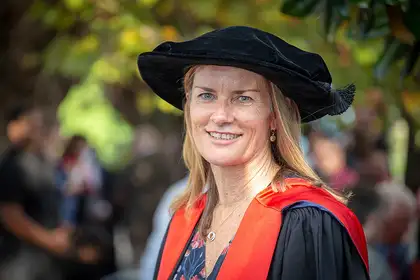
The health benefits of a physically active lifestyle are widely known and have been extensively examined. However, no such investigations have focused on New Zealand women from different ethnicities, nor on their physical activity in relation to health.
Now, new research from Massey University, with collaboration from researchers from Victoria University and Seattle University, suggests obesity rates among New Zealand women might be reduced by promoting activities that are tailored to the cultural backgrounds and preferences of specific ethnic groups.
Dr Wendy O’Brien from Massey’s School of Sport, Exercise and Nutrition, led the research, which has today been published in the Australian and New Zealand Journal of Public Health.
Dr O’Brien, who graduated with her PhD in Auckland in April, examined the physical activity profiles of Māori, Pacific and European women to understand ethnic differences in physical activity, and the implications of ethnic differences on body composition and metabolic health.
“Ethnicity was a major factor in the types and amounts of physical activity performed and in the implications of physical activity on metabolic health markers. Tailoring physical activity recommendations for specific ethnic groups could have major positive health consequences for New Zealand women. We need to look at the likes of whanau-oriented, community-linked and outdoor-based activities, and how we can better promote these types of activities to groups who are most interested and can best identify with them,” she says.
“Encouraging participation in personally or culturally interesting and relevant activities might increase participation in all forms of physical activity, and alleviate some of the health burden caused by inactivity.”
Currently, only 48 per cent of New Zealand adults are sufficiently active to meet the national guidelines. “Time constraints and financial burden are common barriers to participation in physical activity, however childcare responsibilities and social support pose particular barriers for women,” Dr O’Brien says.
“If we can identify and promote activity in settings that will largely overcome these barriers, such as with whanau or community groups, then the chances of exercise participation are almost immediately increased”.
The study, which was part of a larger project (the EXPLORE study - Examining the Predictors Linking Obesity-Related Elements) involved 331 healthy pre-menopausal women, aged 16-45 years of Māori (57), Pacific (65) and European (209) descent. Participants completed online questionnaires about their levels of physical activity in four domains – home, work, recreational and transport. Unlike many other studies that simply record time spent being physically active, participants in this study also recorded which of the 35 groups of activities they had performed. This data gave much greater insight into the types of activities women actually do and therefore, where best to focus physical activity promotion.
Dr O’Brien says many activities were common across the three different ethnicities, while others reflected specific community and cultural connections. “For example, walking was by far the most popular activity across the total population. Team sports, such as touch football and netball, and cultural activities, like kapa haka, rated highly among Māori women, while performing music and dance was popular among Pacific women, and gym-type activities were favoured by European women in our study.”
“We were able to develop suggestions for the activities most preferred and already familiar to each ethnic group to promote physical activity as a normal part of everyday life.”
Dr O’Brien says ultimately, the findings could help improve the health of New Zealand women through participation in physical activity that is interesting and appropriate to the different groups. “Understanding social differences between people of different ethnicities, and how these relate to exercise participation, will enable better understanding of the specific exercise regimes and contexts that may be appropriate and acceptable to women from different ethnicities.”
She was surprised to find out how little some people moved during their day. “Looking at the data, I was really shocked to see that some, thankfully only a few, women seemed to hardly move all day. I’m not talking about not going for a run, or to the gym, I mean hardly moving faster than a slow walk over an entire 24-hour period. I know most of us spend far too much time sitting, but this was something I was quite shocked to see.
“On a positive note though, it motivated me to find simple ways to get, especially inactive, women more active by promoting physical activity as part of normal life, potentially improving the long-term health of a large portion of the population”.
Dr O’Brien also holds a Master of Science, with Distinction from Massey University, and a Bachelor of Sport and Exercise Science from Wintec. Originally from Whakatane, she now resides in West Harbour in Auckland. Dr O’Brien has been employed at Massey University for the past two years, working as a sports laboratory manager and teaching sport science courses.
Ethnic-specific suggestions for physical activity based on existing recreational physical activity preferences of New Zealand women was today published in the Australian and New Zealand Journal of Public Health.
The paper was co-authored by Dr Wendy O’Brien, School of Sport, Exercise and Nutrition, Massey University, Dr Sarah Shultz, Department of Kinesiology, Seattle University, United States, Dr Riz Firestone, Centre for Public Health Research, Massey University, Dr Lily George, School of Social and Cultural Studies, Victoria University, and Associate Professor Rozanne Kruger, School of Sport, Exercise and Nutrition, Massey University.
The EXPLORE study was funded by Nutricia Research Foundation, Lotteries Health Research and the Massey University Research Fund.